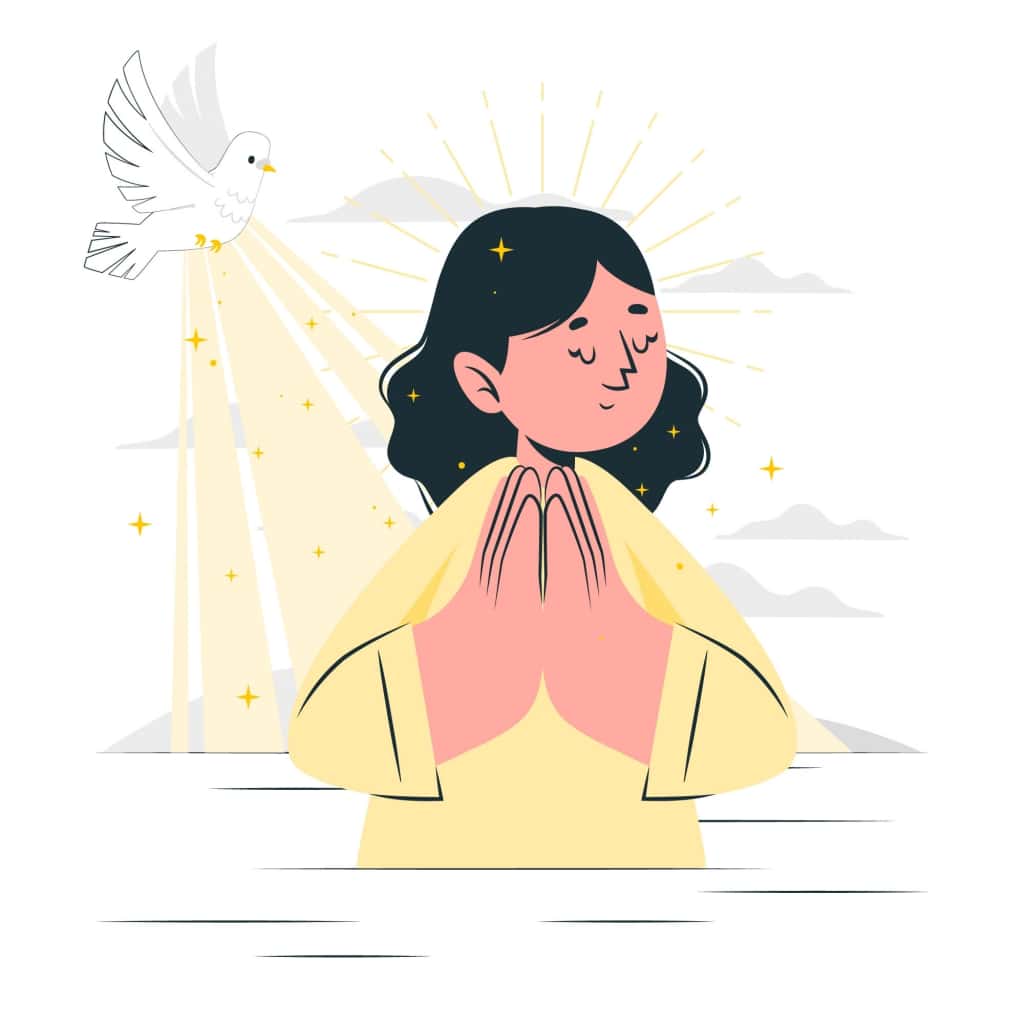Whether you're a devout follower of a specific faith or someone with a more eclectic spiritual journey, understanding your religious values can be a powerful step toward self-awareness. In this blog post, we introduce you to our "Religious Values Test." In just a few moments, you'll have the opportunity to explore the religious values that hold significance in your life.
Get ready to connect with your core values and embark on a profound exploration of faith and meaning.
Table Of Contents
- Religious Values Definition
- Religious Values Test: What Are Your Core Beliefs?
- Key Takeaways
- FAQs About Religious Values Test

Religious Values Definition
Religious values are like the guiding principles that strongly influence how people who follow a particular religion or spiritual tradition behave, make choices, and see the world. These values act as a sort of moral GPS, helping individuals decide what's right and wrong, how to treat others, and how they understand the world.
These values often include ideas like love, kindness, forgiveness, honesty, and doing the right thing, which are seen as really important in many religions.
Religious Values Test: What Are Your Core Beliefs?
1/ When someone is in need, what is your typical response?
- a. Offer assistance and support without hesitation.
- b. Consider helping, but it depends on the circumstances.
- c. It's not my responsibility to help; they should manage on their own.
2/ How do you view telling the truth, even when it's difficult?
- a. Always tell the truth, no matter the consequences.
- b. Sometimes it's necessary to bend the truth to protect others.
- c. Honesty is overrated; people need to be practical.
3/ When someone wrongs you, what is your approach to forgiveness?
- a. I believe in forgiving and letting go of grudges.
- b. Forgiveness is important, but it depends on the situation.
- c. I rarely forgive; people should face the consequences.
4/ How active are you in your religious or spiritual community?
- a. I'm actively involved and contribute my time and resources.
- b. I attend occasionally but keep my involvement minimal.
- c. I don't participate in any religious or spiritual community.
5/ What is your attitude toward the environment and the natural world?
- a. We must protect and care for the environment as stewards of the Earth.
- b. It's here for human use and exploitation.
- c. It's not a top priority; other issues are more important.

6/ Do you regularly engage in prayer or meditation? -Religious Values Test
- a. Yes, I have a daily prayer or meditation routine.
- b. Occasionally, when I need guidance or solace.
- c. No, I don't practice prayer or meditation.
7/ How do you view people from different religious or spiritual backgrounds?
- a. I respect and value the diversity of beliefs in the world.
- b. I'm open to learning about other beliefs but may not fully embrace them.
- c. I believe my religion is the only true path.
8/ What's your attitude toward wealth and possessions? -Religious Values Test
- a. Material wealth should be shared with those in need.
- b. Accumulating wealth and possessions is a top priority.
- c. I find a balance between personal comfort and helping others.
9/ How do you approach a simple and minimalist lifestyle?
- a. I value a simple and minimalist lifestyle, focusing on essentials.
- b. I appreciate simplicity but also enjoy some indulgences.
- c. I prefer a life filled with material comforts and luxuries.
10/ What's your stance on social justice and addressing inequalities?
- a. I'm passionate about advocating for justice and equality.
- b. I support justice efforts when I can, but I have other priorities.
- c. It's not my concern; people should fend for themselves.
11/ How do you view humility in your life? -Religious Values Test
- a. Humility is a virtue, and I strive to be humble.
- b. I find a balance between humility and self-assuredness.
- c. It's not necessary; confidence and pride are more important.
12/ How often do you engage in charitable acts or donate to those in need?
- a. Regularly; I believe in giving back to my community and beyond.
- b. Occasionally, when I feel compelled or it's convenient.
- c. Rarely or never; I prioritize my own needs and desires.
13/ How important are the sacred texts or scriptures of your religion to you?
- a. They are the foundation of my faith, and I study them regularly.
- b. I respect them but don't delve into them deeply.
- c. I don't pay much attention to them; they're not relevant to my life.
14/ Do you set aside a day for rest, reflection, or worship? - Religious Values Test
- a. Yes, I observe a regular day of rest or worship.
- b. Occasionally, when I feel like taking a break.
- c. No, I don't see the need for a designated day of rest.
15/ How do you prioritize your family and relationships?
- a. My family and relationships are my top priority.
- b. I balance family and personal aspirations equally.
- c. They're important, but career and personal goals come first.

16/ How often do you express gratitude for the blessings in your life?
- a. Regularly; I believe in appreciating the good in my life.
- b. Occasionally, when something significant happens.
- c. Rarely; I tend to focus on what I lack rather than what I have.
17/ How do you approach resolving conflicts with others? -Religious Values Test
- a. I actively seek resolution through communication and understanding.
- b. I handle conflicts on a case-by-case basis, depending on the situation.
- c. I avoid conflict and let things sort themselves out.
18/ How strong is your faith in a higher power or the divine?
- a. My faith in the divine is unwavering and central to my life.
- b. I have faith, but it's not the sole focus of my spirituality.
- c. I don't believe in a higher power or divine force.
19/ How important is selflessness and helping others in your life?
- a. Helping others is a fundamental part of my life's purpose.
- b. I believe in helping when I can, but self-preservation is important too.
- c. I prioritize my own needs and interests above helping others.
20/ What are your beliefs about life after death? -Religious Values Test
- a. I believe in an afterlife or reincarnation.
- b. I'm uncertain about what happens after we die.
- c. I believe that death is the end, and there is no afterlife.

Scoring - Religious Values Test:
The point value for each response is as follows: "a" = 3 points, "b" = 2 points, "c" = 1 point.
Answers - Religious Values Test:
- 50-60 points: Your values strongly align with many religious and spiritual traditions, emphasizing love, compassion, and ethical behavior.
- 30-49 points: You have a mix of values that may reflect a blend of religious and secular beliefs.
- 20-29 points: Your values tend to be more secular or individualistic, with less emphasis on religious or spiritual principles.
*NOTE! Please note that this is a general test and doesn't encompass all possible religious values or beliefs.
Key Takeaways
In wrapping up our religious values test, remember that understanding your core beliefs is a powerful step toward self-awareness and personal growth. Whether your values align with a specific faith or reflect a broader spirituality, they play a significant role in shaping who you are.
To further explore your interests and create engaging quizzes, don't forget to check out AhaSlides templates for more exciting quizzes and learning experiences!
FAQs About Religious Values Test
What are religious values and examples?
Religious values are core beliefs and principles that guide the behavior and moral choices of individuals based on their faith. Examples include love, compassion, honesty, forgiveness, and charity.
What is the religious test of faith?
The religious test of faith is a challenge or trial of one's faith, often used to measure a person's commitment or belief in their religion. It may involve difficult circumstances or moral dilemmas.
Why are religious values important?
They provide a moral framework, guiding individuals in making ethical decisions, fostering empathy, and promoting a sense of community and purpose within a religious context.
Ref: Pew Research Center | Proprofs








